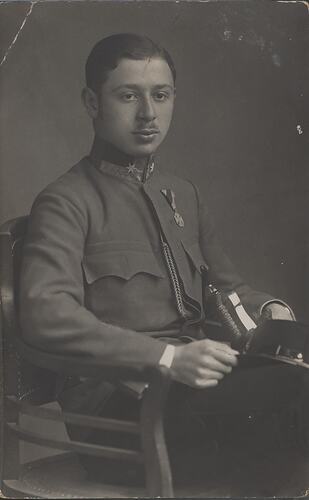Summary
Black and white studio portrait printed on a postcard, depicting Leo Sterne as a young man dressed in the Austrian military uniform circa 1916.
This photograph relates to the lives of Leo and Hilda Sterne prior to their migration to Australia from Linz, Austria in 1939, joining other family members who had arrived in 1938. The Sternes (originally Sternschein), listed as 'stateless', were probably refugees accepted as part of the Australian Government's Jewish quota intake just prior to World War II. The Sterne's went on to found the successful L.J. Sterne Doll Company. Leo Sterne is recorded as having enlisted in the Citizen's Military Forces during World War II and in 1944 he was naturalised.
Description of Content
Leo Sterne as a young man during the First World War. He is dressed in the Austrian military uniform, with a dress sword and cap held in his lap. The rank patch on the collar of his tunic identifies him as an Officer-Candidate. There is a cross-shaped medal on the breast of his coat, possibly a Karl Troop Cross, which would indicate he was in a combatant unit for a minimum of twelve weeks, and had served at the front. This medal was awarded between December 1916 and November 1918. He is looking towards the camera, though not directly at it.
Physical Description
Black and white studio portrait printed on a postcard.
Significance
This item is part of a growing collection of material relating to the migration and settlement experiences of Leo and Hilda Sterne who arrived in Melbourne in 1939. They immediately established a business that became one of the most successful doll and toy manufacturers in post-war Melbourne.
The L.J. Sterne Doll Company (1939-71) is significant as one of the few surviving collections related to an Australian toy and doll manufacturer, a once thriving industry in Australia. Only the A.L. Lindsay and Co. Archive at the Powerhouse Museum and the Jakas Toy collection at Melbourne Victoria are comparable.
This collection of photographs, business and promotional documents, dolls, and toys enables the exploration of many Australian post-war historical and social themes including: local television and manufacturing industries; design and production innovation; marketing and merchandising; childhood; gender and cultural representations; leisure and sport; key cultural and historical events.
More Information
-
Collection Names
-
Collecting Areas
-
Acquisition Information
Purchase
-
Place & Date Depicted
-
Person Depicted
-
Format
Photograph, Black & White
-
Language
English
-
Inscriptions
On reverse, handwritten in grey lead: 'Leo Stern'
-
Classification
-
Category
-
Discipline
-
Type of item
-
Image Dimensions - Photograph
85 mm (Width), 136 mm (Height)
-
Keywords
Military Uniforms, Military Equipment, Military Medals, Hair Styles, World War I, 1914-1918
